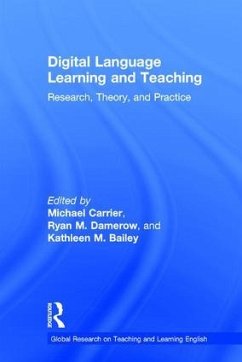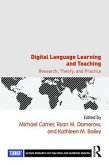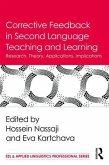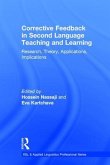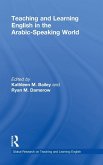Digital Language Learning and Teaching
Research, Theory, and Practice
Herausgeber: Carrier, Michael; Bailey, Kathleen M.; Damerow, Ryan M.
Digital Language Learning and Teaching
Research, Theory, and Practice
Herausgeber: Carrier, Michael; Bailey, Kathleen M.; Damerow, Ryan M.
- Gebundenes Buch
- Merkliste
- Auf die Merkliste
- Bewerten Bewerten
- Teilen
- Produkt teilen
- Produkterinnerung
- Produkterinnerung
This carefully balanced set of studies and practitioner research projects carried out in various learning contexts around the world highlights cutting-edge research in the use of digital learning technologies in language classrooms and in online learning, providing an overview of recent developments in the application of educational technology to language learning and teaching,
Andere Kunden interessierten sich auch für
![Digital Language Learning and Teaching Digital Language Learning and Teaching]() Digital Language Learning and Teaching64,99 €
Digital Language Learning and Teaching64,99 €![Corrective Feedback in Second Language Teaching and Learning Corrective Feedback in Second Language Teaching and Learning]() Corrective Feedback in Second Language Teaching and Learning54,99 €
Corrective Feedback in Second Language Teaching and Learning54,99 €![Research on English Language Teaching and Learning in the Middle East and North Africa Research on English Language Teaching and Learning in the Middle East and North Africa]() Research on English Language Teaching and Learning in the Middle East and North Africa182,99 €
Research on English Language Teaching and Learning in the Middle East and North Africa182,99 €![Corrective Feedback in Second Language Teaching and Learning Corrective Feedback in Second Language Teaching and Learning]() Corrective Feedback in Second Language Teaching and Learning202,99 €
Corrective Feedback in Second Language Teaching and Learning202,99 €![Teaching and Learning English in the Arabic-Speaking World Teaching and Learning English in the Arabic-Speaking World]() Teaching and Learning English in the Arabic-Speaking World202,99 €
Teaching and Learning English in the Arabic-Speaking World202,99 €![Teaching and Learning English in the Arabic-Speaking World Teaching and Learning English in the Arabic-Speaking World]() Teaching and Learning English in the Arabic-Speaking World69,99 €
Teaching and Learning English in the Arabic-Speaking World69,99 €![Language Learning Motivation in a Multilingual Chinese Context Language Learning Motivation in a Multilingual Chinese Context]() Mairin Hennebry-LeungLanguage Learning Motivation in a Multilingual Chinese Context57,99 €
Mairin Hennebry-LeungLanguage Learning Motivation in a Multilingual Chinese Context57,99 €-
-
-
This carefully balanced set of studies and practitioner research projects carried out in various learning contexts around the world highlights cutting-edge research in the use of digital learning technologies in language classrooms and in online learning, providing an overview of recent developments in the application of educational technology to language learning and teaching,
Produktdetails
- Produktdetails
- Verlag: Routledge
- Seitenzahl: 280
- Erscheinungstermin: 16. Februar 2017
- Englisch
- Abmessung: 235mm x 157mm x 20mm
- Gewicht: 560g
- ISBN-13: 9781138696808
- ISBN-10: 1138696803
- Artikelnr.: 49392099
- Herstellerkennzeichnung
- Libri GmbH
- Europaallee 1
- 36244 Bad Hersfeld
- gpsr@libri.de
- Verlag: Routledge
- Seitenzahl: 280
- Erscheinungstermin: 16. Februar 2017
- Englisch
- Abmessung: 235mm x 157mm x 20mm
- Gewicht: 560g
- ISBN-13: 9781138696808
- ISBN-10: 1138696803
- Artikelnr.: 49392099
- Herstellerkennzeichnung
- Libri GmbH
- Europaallee 1
- 36244 Bad Hersfeld
- gpsr@libri.de
Michael Carrier is the CEO of Highdale Consulting Ltd., UK (specializing in digital learning and capacity building in international education), and former Director of Strategic Partnerships at Cambridge English Language Assessment, UK. Ryan M. Damerow is the Chief Operating Officer of The International Research Foundation for English Language Education (TIRF), USA. Kathleen M. Bailey is a Professor of Applied Linguistics at the Middlebury Institute of International Studies at Monterey and the President of The International Research Foundation for English Language Education (TIRF), USA.
1. Introduction to Digital Learning Michael Carrier Part I: The Research
Perspective 2. The Effectiveness of Digital Materials as a Means of
Teaching the English Article System Fei-Yu Chuang 3. Tracing the Potential
of Out-Of-Class Digitally Mediated Language Learning Practice Back to the
Classroom: A Nexus of Practice Perspective Freek Olaf de Groot 4.
Evaluating the Efficacy of the Digital Commons for Scaling Data-Driven
Learning Alannah Fitzgerald, Maria Jose Marin, Shaoqun Wu, and Ian H.
Witten 5. Doctoral Students' Attitudes and Beliefs towards Blended Learning
in an English as Foreign Language (EFL) Writing Course Zhuo Li and
Chu-Chuan Chiu 6. Technology as a Teaching and Learning Tool in the Flipped
Classroom Jeff Mehring 7. The Effectiveness of Feedback in Asynchronous
Online Courses for Nonnative Speakers of English Larisa Olesova and
Jennifer Richardson 8. Digital Tools for Supporting English Language
Learners' Content Area Writing Briana Ronan 9. The Underutilized Elephant
in the Lecture Room: Why Five Tech-Savvy Teacher Educators Didn't Use Their
Program's Digital Whiteboard Ksan Rubadeau 10. Digital Stories and the
African Storybook: Teaching English in the Digital Age Espen
Stranger-Johannessen 11. Teaching with Digital Stories for Student
Empowerment and Engagement Polina Vinogradova Part II: The Pedagogical
Perspective 12. Synchronous Online Teaching Nik Peachey 13. Using Learner
Experience Design (LXD) to Improve Digital Language-Learning Products Nick
Robinson and Laurie Harrison 14. Blended Learning Design and Practice Pete
Sharma 15. A Genuine Innovation in The Delivery and Form of Feedback on
Students' Written Work Russell Stannard 16. Remote Teaching: A Case Study
in Teaching English to Primary School Children in Uruguay via
Videoconferencing Graham Stanley 17. Digital Assessment Nick Saville 18.
Empowering Teachers for the Digital Future: What Do 21st-Century Teachers
Need? Michael Carrier and Andrew Nye 19. Imagining the Potential for Using
Virtual Reality Technologies in Language Learning Anna Lloyd, Sarah
Rogerson, and Geoff Stead 20. Digital Learning in 2020 Nicky Hockly and
Gavin Dudeney
Perspective 2. The Effectiveness of Digital Materials as a Means of
Teaching the English Article System Fei-Yu Chuang 3. Tracing the Potential
of Out-Of-Class Digitally Mediated Language Learning Practice Back to the
Classroom: A Nexus of Practice Perspective Freek Olaf de Groot 4.
Evaluating the Efficacy of the Digital Commons for Scaling Data-Driven
Learning Alannah Fitzgerald, Maria Jose Marin, Shaoqun Wu, and Ian H.
Witten 5. Doctoral Students' Attitudes and Beliefs towards Blended Learning
in an English as Foreign Language (EFL) Writing Course Zhuo Li and
Chu-Chuan Chiu 6. Technology as a Teaching and Learning Tool in the Flipped
Classroom Jeff Mehring 7. The Effectiveness of Feedback in Asynchronous
Online Courses for Nonnative Speakers of English Larisa Olesova and
Jennifer Richardson 8. Digital Tools for Supporting English Language
Learners' Content Area Writing Briana Ronan 9. The Underutilized Elephant
in the Lecture Room: Why Five Tech-Savvy Teacher Educators Didn't Use Their
Program's Digital Whiteboard Ksan Rubadeau 10. Digital Stories and the
African Storybook: Teaching English in the Digital Age Espen
Stranger-Johannessen 11. Teaching with Digital Stories for Student
Empowerment and Engagement Polina Vinogradova Part II: The Pedagogical
Perspective 12. Synchronous Online Teaching Nik Peachey 13. Using Learner
Experience Design (LXD) to Improve Digital Language-Learning Products Nick
Robinson and Laurie Harrison 14. Blended Learning Design and Practice Pete
Sharma 15. A Genuine Innovation in The Delivery and Form of Feedback on
Students' Written Work Russell Stannard 16. Remote Teaching: A Case Study
in Teaching English to Primary School Children in Uruguay via
Videoconferencing Graham Stanley 17. Digital Assessment Nick Saville 18.
Empowering Teachers for the Digital Future: What Do 21st-Century Teachers
Need? Michael Carrier and Andrew Nye 19. Imagining the Potential for Using
Virtual Reality Technologies in Language Learning Anna Lloyd, Sarah
Rogerson, and Geoff Stead 20. Digital Learning in 2020 Nicky Hockly and
Gavin Dudeney
1. Introduction to Digital Learning Michael Carrier Part I: The Research
Perspective 2. The Effectiveness of Digital Materials as a Means of
Teaching the English Article System Fei-Yu Chuang 3. Tracing the Potential
of Out-Of-Class Digitally Mediated Language Learning Practice Back to the
Classroom: A Nexus of Practice Perspective Freek Olaf de Groot 4.
Evaluating the Efficacy of the Digital Commons for Scaling Data-Driven
Learning Alannah Fitzgerald, Maria Jose Marin, Shaoqun Wu, and Ian H.
Witten 5. Doctoral Students' Attitudes and Beliefs towards Blended Learning
in an English as Foreign Language (EFL) Writing Course Zhuo Li and
Chu-Chuan Chiu 6. Technology as a Teaching and Learning Tool in the Flipped
Classroom Jeff Mehring 7. The Effectiveness of Feedback in Asynchronous
Online Courses for Nonnative Speakers of English Larisa Olesova and
Jennifer Richardson 8. Digital Tools for Supporting English Language
Learners' Content Area Writing Briana Ronan 9. The Underutilized Elephant
in the Lecture Room: Why Five Tech-Savvy Teacher Educators Didn't Use Their
Program's Digital Whiteboard Ksan Rubadeau 10. Digital Stories and the
African Storybook: Teaching English in the Digital Age Espen
Stranger-Johannessen 11. Teaching with Digital Stories for Student
Empowerment and Engagement Polina Vinogradova Part II: The Pedagogical
Perspective 12. Synchronous Online Teaching Nik Peachey 13. Using Learner
Experience Design (LXD) to Improve Digital Language-Learning Products Nick
Robinson and Laurie Harrison 14. Blended Learning Design and Practice Pete
Sharma 15. A Genuine Innovation in The Delivery and Form of Feedback on
Students' Written Work Russell Stannard 16. Remote Teaching: A Case Study
in Teaching English to Primary School Children in Uruguay via
Videoconferencing Graham Stanley 17. Digital Assessment Nick Saville 18.
Empowering Teachers for the Digital Future: What Do 21st-Century Teachers
Need? Michael Carrier and Andrew Nye 19. Imagining the Potential for Using
Virtual Reality Technologies in Language Learning Anna Lloyd, Sarah
Rogerson, and Geoff Stead 20. Digital Learning in 2020 Nicky Hockly and
Gavin Dudeney
Perspective 2. The Effectiveness of Digital Materials as a Means of
Teaching the English Article System Fei-Yu Chuang 3. Tracing the Potential
of Out-Of-Class Digitally Mediated Language Learning Practice Back to the
Classroom: A Nexus of Practice Perspective Freek Olaf de Groot 4.
Evaluating the Efficacy of the Digital Commons for Scaling Data-Driven
Learning Alannah Fitzgerald, Maria Jose Marin, Shaoqun Wu, and Ian H.
Witten 5. Doctoral Students' Attitudes and Beliefs towards Blended Learning
in an English as Foreign Language (EFL) Writing Course Zhuo Li and
Chu-Chuan Chiu 6. Technology as a Teaching and Learning Tool in the Flipped
Classroom Jeff Mehring 7. The Effectiveness of Feedback in Asynchronous
Online Courses for Nonnative Speakers of English Larisa Olesova and
Jennifer Richardson 8. Digital Tools for Supporting English Language
Learners' Content Area Writing Briana Ronan 9. The Underutilized Elephant
in the Lecture Room: Why Five Tech-Savvy Teacher Educators Didn't Use Their
Program's Digital Whiteboard Ksan Rubadeau 10. Digital Stories and the
African Storybook: Teaching English in the Digital Age Espen
Stranger-Johannessen 11. Teaching with Digital Stories for Student
Empowerment and Engagement Polina Vinogradova Part II: The Pedagogical
Perspective 12. Synchronous Online Teaching Nik Peachey 13. Using Learner
Experience Design (LXD) to Improve Digital Language-Learning Products Nick
Robinson and Laurie Harrison 14. Blended Learning Design and Practice Pete
Sharma 15. A Genuine Innovation in The Delivery and Form of Feedback on
Students' Written Work Russell Stannard 16. Remote Teaching: A Case Study
in Teaching English to Primary School Children in Uruguay via
Videoconferencing Graham Stanley 17. Digital Assessment Nick Saville 18.
Empowering Teachers for the Digital Future: What Do 21st-Century Teachers
Need? Michael Carrier and Andrew Nye 19. Imagining the Potential for Using
Virtual Reality Technologies in Language Learning Anna Lloyd, Sarah
Rogerson, and Geoff Stead 20. Digital Learning in 2020 Nicky Hockly and
Gavin Dudeney

